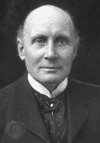 Alfred North Whitehead (1861-1947), was a British mathematician, logician and philosopher perhaps best known for his work in
mathematical logic. In collaboration with Bertrand Russell, Whitehead authored the landmark three-
volume Principia Mathematica (1910, 1912, 1913).
Alfred North Whitehead (1861-1947), was a British mathematician, logician and philosopher perhaps best known for his work in
mathematical logic. In collaboration with Bertrand Russell, Whitehead authored the landmark three-
volume Principia Mathematica (1910, 1912, 1913).At the University of London, Whitehead was Dean of the Faculty of Science. Many of the essays in his The Aims of Education and Other Essays (1929) date from this time and other less well known books, including An Inquiry Concerning the Principles of Natural Knowledge (1919), The Concept of Nature (1920) and The Principle of Relativity (1922).
After forceable age-retirement, Whitehead came to Harvard University and spent the remainder of his life in America. This portion of his life was concerned with his quite unique philosophy, set forth in his "magnum opus", Process and Reality. However, it was sometimes joked that the first philosophy lectures he ever attended were those he delivered at Harvard in his new role as Professor of Philosophy. A year later he also delivered Harvard's prestigious Lowell Lectures which formed the basis for his first primarily metaphysical book, Science and the Modern World (1925). In it he again introduced several themes which later found fuller expression in Process and Reality.
In 1927-18 Whitehead delivered the prestigious Gifford Lectures at the University of Edinburgh on which Process and Reality came to be based.
Its basic idea is that we abstract the idea of a spatial point by a real-life series of volumes extending over each other, comparable to a nest of Russian dolls or an interleaving of pots and pans. "In a certain sense, verything is everywhere at all times. For every location involves an aspect of itself in every other location. Thus every spatio-temporal standpoint mirrors the world." He argued that process, rather than substance, should be taken as the fundamental metaphysical constituent of the world.
What Whitehead said about the nature of mathematics is remarkable:
"I will not go so far as to say that to construct a history of thought without profound
study of the mathematical ideas of successive epochs is like omitting Hamlet from the play which
is named after him. That would be claiming too much. But it is certainly analogous to cutting out
the part of Ophelia. This simile is singularly exact. For Ophelia is quite essential to the play,
she is very charming ... and a little mad. Let us grant that the pursuit of mathematics is a divine
madness of the human spirit, a refuge from the goading urgency of contingent happenings."
This is complimented by his implication about the proper use of mathematics:
"It is a profoundly erroneous truism, repeated by all copy books and by eminent people when they
are making speeches, that we should cultivate the habit of thinking of what we are doing. The
precise opposite is the case. Civilization advances by extending the number of important operations
which we can perform without thinking about them." An Introduction to Mathematics (1911)
To this, I append my own comment. It is a purpose of mathematics to deal with the routine in a routine way, saving much time and money, so that managers, editors, experts can deal with the nonroutine. In the literature, this is known as "management-by-exception", generalizing application of "quality-control charts.
Wiener puts it his own way.